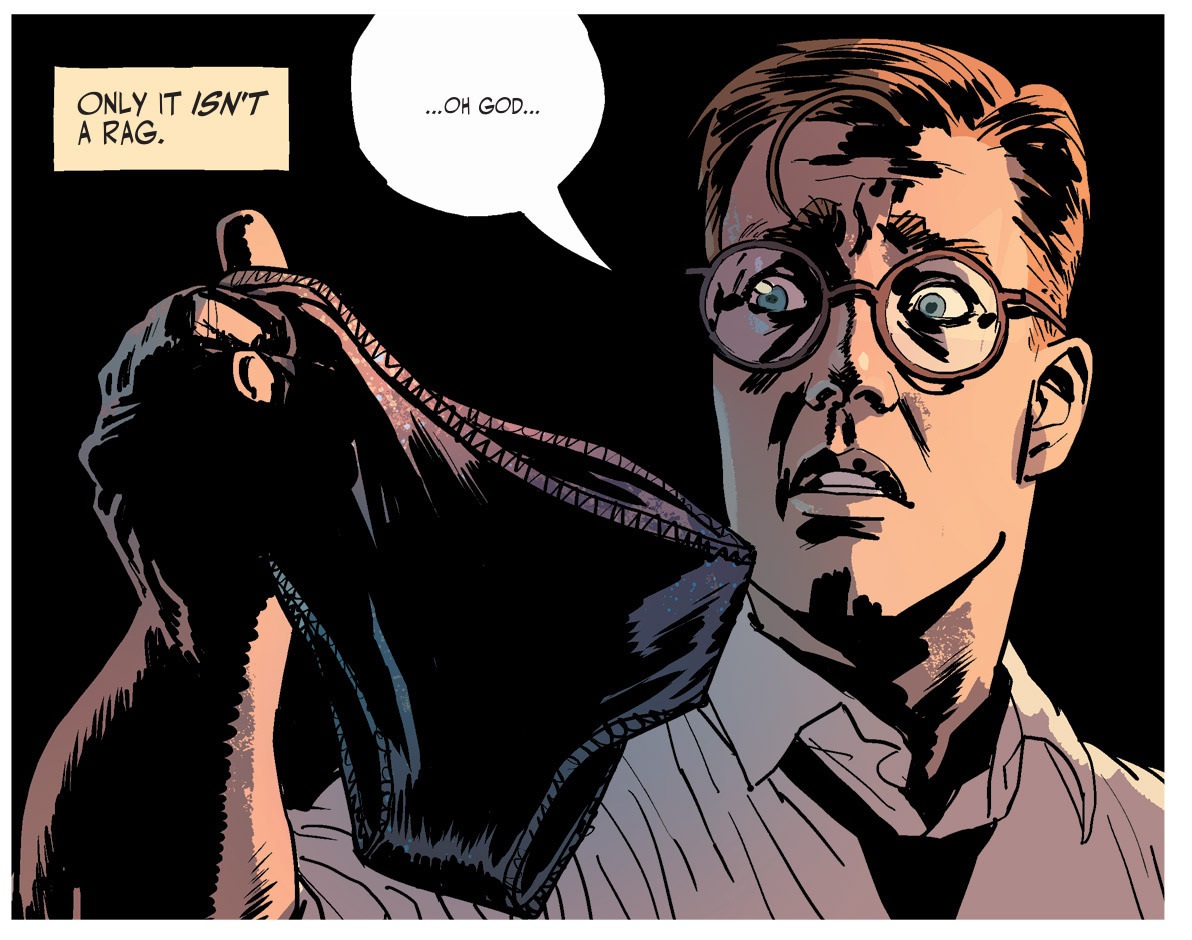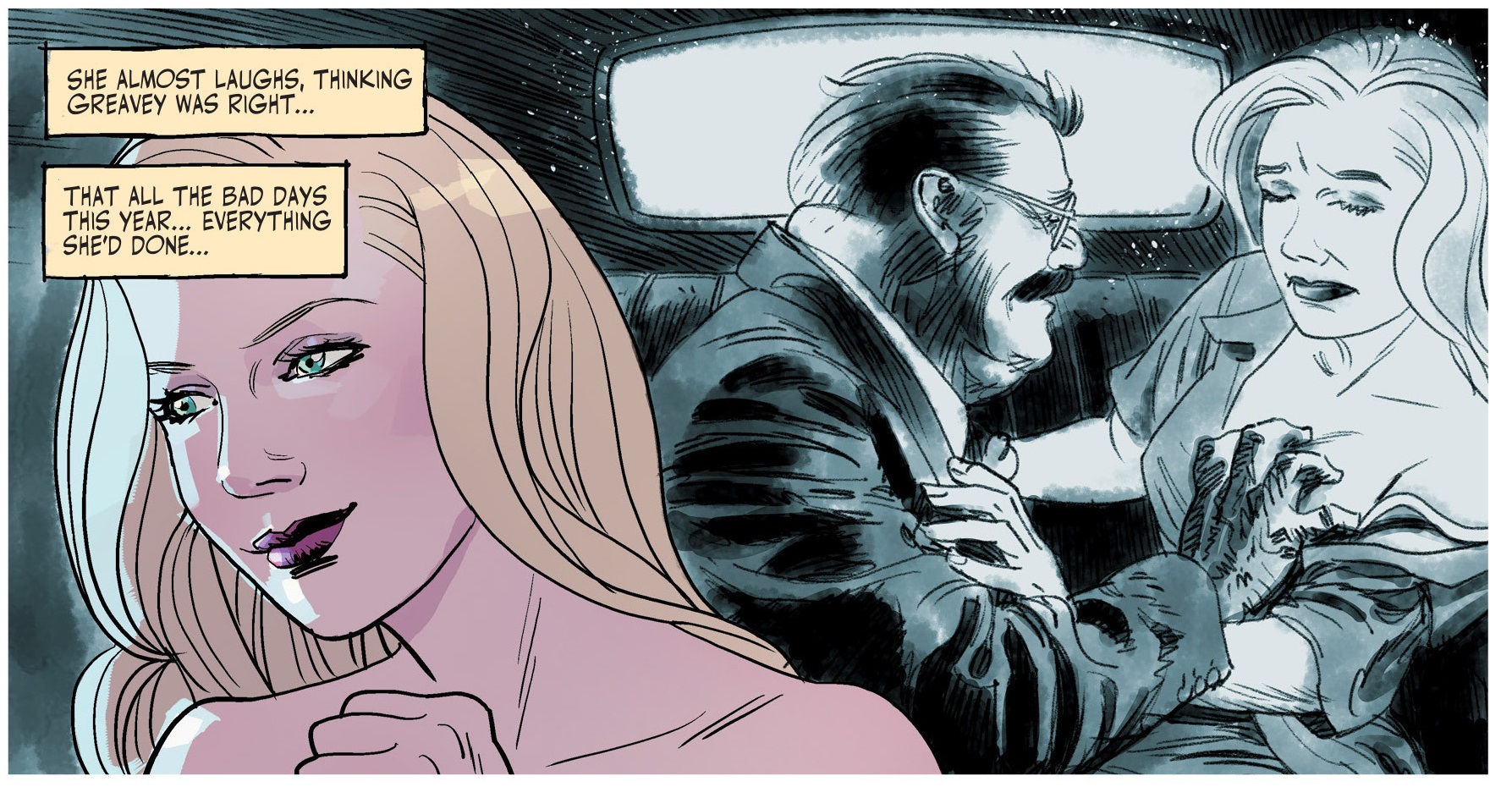A Review of The Fade Out by Ed Brubaker, Sean Phillips, and Elizabeth Breitweiser.
_____________
Synopsis: 1948 Hollywood. Charlie Parish wakes up from a drunken stupor to find a dead starlet in the room next door. He covers things up and later finds out that the studio is making things go away with a story about a suicide. Parish has writer’s block but he’s aided by his blacklisted writer-mentor, Gil Mason—a loose cannon who will soon turns things upside down for him. At the edge of Parish’s vision is a Hollywood fixer-producer in the vein of Eddie Mannix. A new star is cast and it seems like the couch really sucked way back then. Movie execs—they suck (and seem to have a thing for kids)! Actors—they like sex and porn! Orgies, sex communes, violence, the red carpet, bar fights, homosexuals in car accidents (seems like a Van Johnson reference)…etc.
_____________
Some people told me to read this. And I’ve seen it recommended to semi-retired comic readers returning to the fold; just like you would, say, hand a copy of Maus to your friend the sniffy English Literature/Media Studies professor (but not Watchmen presumably).
It’s as if these friendly comics evangelists hadn’t read a single noir novel, watched Chinatown (or Farewell, My Lovely, or Sunset Boulevard or whatever) even once, or been apprised of the assorted falsehoods of Kenneth Anger’s Hollywood Babylon. Because you don’t need to be an aficionado to realize that almost everything on display here is as old as the Hollywood hills—the drunken pool side orgies, the black list, the abused ingenue, the darkened rooms where the wretched eke out their meager lives on typewriters, hard liquor, and shadows from louvered blinds. It’s as if someone went to some Hollywood noir buffet, stuffed himself silly and then purged himself in both directions with the vigor of a water cannon.
And, hey, didn’t I see this one on Ray Donovan just the other day? I mean the whole waking up beside/near/on top of a dead woman thing. He like sorted it out in about 10 minutes after smacking some people around, which is about the maximum amount of the time I can tolerate this nonsense. Dead women and tortured writers—they go together like horses and carriages in Hollywood apparently; like pineapples and Mai Tais—the men being the hard rum and the women the delicately sliced garnishings. What we need is more broody depressed women waking up beside dead men for a change (kidding).
So a tiresome retread then.
If not for Sean Phillips photo-referenced studiousness, this would be almost unreadable. It is Phillips’ art which carries the comic’s sense of time and space. Every other character seems to be scraping by on the barest of plots (sexual deviance, pedophilia, your common or garden listlessness) and headlines cribbed from crumbling newsprint—Wars! Scandal! Commies! The smattering of period history smothers any sense of suspense or urgency. This isn’t the “real” world; it’s lousy, meaningless research (and I’m not talking about the photo reference which is fine).
On the other hand, did women’s panties really look like men’s briefs back in the late 40s?
Now there’s a trick when you’re too lazy to do the work—it’s called just making things up. Frank Miller had a firm grasp of this principle in The Hard Goodbye (the first Sin City story). There’s a dead woman in a heart-shaped bed in this one as well but Miller isn’t interested in ladling on the “reality.” The only thing that concerns Miller in Sin City are his sexual fetishes—his deep conviction that every woman really wants to be a stripper and/or a whore, and every man a pimp and a bouncer. The first Sin City, at least, is essentially one long act of masturbation, and the characters and situations fully coherent within that setting. The Fade Out wants the regurgitateded noir tropes with the historical reality and succeeds at neither. The women don’t fare much better either, mostly fucking and sucking to get by; occasionally beaten up and then dying.
Otherwise, housewives (okay, there’s a lady publicity agent in there as well but maybe she’s the murderer). It’s all in the Hollywood scandal playsheet. I always knew that Father Knows Best gave us the whole truth about American life.
Now I have nothing against homage and there’s quite a bit of that going on in The Fade Out. It’s cute when you have Otto Preminger turn up as the exemplar German film noir director or when you see a skewed version of Gun Crazy filmed later in the series. But what I do find utterly tedious is the rehashed war traumatized, guilt-ridden, would be writer-detective stumbling his way through a Hollywood conspiracy thingamabob. And of course he falls in love and gets to have great sex with the Veronica Lake lookalike. I mean, why wouldn’t he? It’s called motivation. The sex, as always, is a call to action, and there’s also an important plot point which turns on the fact that she has been told to shave her pubic hair. This only happens in the real world.
I think we’ve just about sucked the marrow dry when it comes to stories Hollywood tells about itself. And yet a surfeit of vanity and forgetfulness means that we will never see the end of these projects. With cinema now the new religion, it seems only natural that comics should pay deference to this modern Moloch. You should be careful that he doesn’t eat your brains though.



Yeah, I gave this a try when it started (I was feeling sentimental about buying floppy comic books on a monthly basis) but I gave up after a few issues. Specifically, I lasted until the issue where they run into Clark Gable. Phillips is a fine artist but the way that he drew Gable made it obvious he was using more photo reference for him than any other character, effectively turning him into a visual alien within the cast. Helped me realize how little I cared about what I was reading.
If cinema is the new religion, does that mean The Golden Age of TV is the Reformation?
I take it the writer of this post is no fan of Barton Fink? Although that film has enough of the patent Coen brothers “offness” to keep it fairly fresh…
I was pretty okay with Barton Fink the last time I watched it which was probably over 20 years ago (?). As you say, it has the usual Coen Bros. ticks to keep it interesting. Not a good comparison to this comic though which is straight as an arrow and virtually anonymous.
As for the Golden Age of TV, I think less the Reformation and more Joseph Smith meeting the angel Moroni.
What exactly is this review reviewing? It just says “The Fade Out” which has a couple issues yet to come out before it’s finished. Is this a review of the first collected volume? The first two? The issues that have so far been published?
Anyway, fair points are made in the review, but evoking Chinatown and Farewell My Lovely while being annoyed at the throwbacky noir-ness of the story seems weird. Those movies came out in the 1970s!
Just the first 8 issues.
There was a version of Farewell, My Lovely which came out in the 40s but called Murder, My Sweet in the U.S. apparently. It’s pretty okay iirc.
Anyway, I’m not annoyed at the throwbacky noir-ness. I’m annoyed at the lousiness and lack of added value to the throwbacky noir-ness. Shouldn’t I just go back to the original and better versions of the throwbacky noir-ness then? You know, instead of reading this pale imitation.
You should totally go back to the original and better versions of the throwbacky noir-ness then. Or go back to the original noir-ness (of which Murder My Sweet is a perfectly good example — I thought you meant the Mitchum version, which is dumb).
Like I said, I think you make some good points about this being a pretty standard Hollywood underbelly story, but as far as value added: they don’t really make movies like this anymore and movies aren’t comics anyway. Which is to say, for me, it’s a perfectly fun way to spend a couple hours reading a comics version of a thing that’s very similar to a thing I enjoy in another medium when that medium last gave me that thing (with any regularity) 75 years ago.
Having said that, your well-meaning but hopelessly illiterate friends should’ve recommended any of the CRIMINAL volumes because those are 1.) better and 2.) less self-consciously slavish to genre and period. (Though they’re still pretty self-consciously slavish to genre and period.)
The Last Seduction was pretty great —which is mid 90s? Not so long ago. And Ex Machina hits all the noir tropes, while imaginatively reworking them. I wouldn’t say it’s a great movie, but it sure sounds better than this dreck.
I hate to say it, but this article actually makes me want to read that comic. Chockful of neat stuff, eh?
Mission accomplished then! My dream is to make Ed Brubaker a multi-millionaire if he isn’t one already.
I haven’t read this one, but I’ve read a bunch of other Brubaker/Phillips collaborations and…the widespread acclaim for their warmed-over noir pastiches reminds me of Gary Groth’s diss of Stray Bullets.(I think Groth was wrong about Stray Bulletes, tho). They’re competently put together, but not much more than that, as far as I can see.
(I did enjoy Brubaker et al’s Captain America, on the other hand)
Stray Bullets isn’t that much of a pastiche though. Or at least what I remember of it. Had the crime tropes without being excessively beholden? I think competently together is about as good as it gets in The Fade Out.
I can’t say I enjoyed the Brubaker Captain America. The best I can say about it is that it wasn’t especially irritating.
I wasn’t thinking of SB as a pastiche specifically, more the general thrust of this mini-review from Groth back in the day:
Stray Bullets “is proof that the fanboy cognoscenti […]are desperate to validate anything that doesn’t look like a superhero or movie tie-in as a mature use of the comics medium. […] It is, in fact, nothing more than a modest, competently executed, middle-of-the-road genre entertainment, and as artless and unoriginal as that sounds.”
tbh, I only thought of it because Jog got there first (not about Brubaker/Phillips in particular, but about current Image comics generally)
Is there supposed to be a link in the comment above? It doesn’t seem to be working.
Anyway, Groth was *probably* correct about “fanboys” wanting to validate anything that wasn’t a superhero comic at the time, but I think comics have moved past that stage. I think readers who like The Fade Out genuinely love the material. Or at least as much as they like the average acclaimed TV series.
As for Image, Alan Moore just revealed on his Goodreads Q+A that he loves Saga and thinks BKV is fantastic! Of course, no one ever said that Alan Moore has good taste in comics.
Ah, here:
http://www.tcj.com/this-week-in-comics-11415-graven-images/
The only good thing about THE FADE OUT: https://medium.com/@afterenthusiasm/the-crinkles-of-sean-phillips-196e2db810ba#.f3mdo69ue